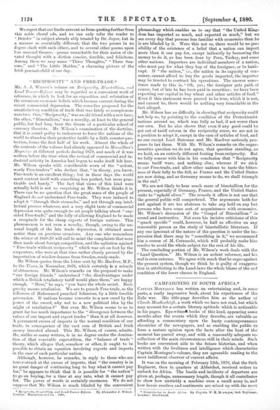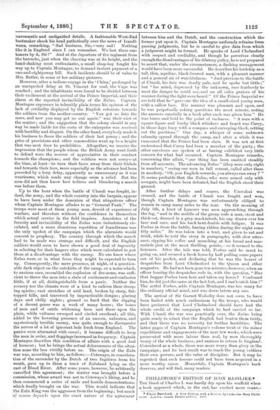CAMPAIGNING IN SOUTH AFRICA.*
CAPTAIN MONTAGUE has written an entertaining and, in some parts, a really impressive book, about his experiences of the Zulu war. His title-page describes him as the author of Claude Meadowleigh, a work which we have not read, but which may account for a certain literary aptitude which is noticeable- in his pages. Eye-witneill books of this kind, appearing some months after the events which they describe, are valuable as affording a commentary upon the hasty contemporaneous chronicles of the newspapers, and as enabling the public to form a mature opinion upon the facts after the heat of the moment has passed away, and with a reasonably adequate re- collection of the main circumstances still in their minds. Such books are convenient aids to the future historian, and when written with the liveliness and intelligence which characterise, Captain Montague's volume, they are agreeable reading to the most indifferent observer of current affairs.
It was on the morning of February 12th, 1879, that the 94th Regiment, then in quarters at Aldershot, received orders to embark for Africa. The bustle and incidents of departure are given at, perhaps, unnecessary length, though it all contributes to show how unwieldy a machine even a small army is, and how heroic resolves and sentiments are mixed up with the most • Compoigolog in South Aft:ca. By Captain W. B. Muammar; Mb &Timm,. Lyndon: Blackwood.
unromantic and undignified details. A fashionable West-End bootmaker shook his head pathetically over the news of Isandl- wane, remarking, " Sad business, Sir,—very sad ! Nothing like it in England since I can remember. We lost three cus- tomers by it, Sir!" And at the departure of the regiment from the barracks, just when the cheering was at its height, and the hand-shaking most enthusiastic, a small shop-boy fought his way up to Captain Montague, to demand instant payment of a one-and-eightpenny bill. Such incidents should be of value to Mrs. Butler, in some of her military pictures.
However, after a tedious voyage in the China,' prolonged by an unexpected delay at St. Vincent for coal, the Cape was reached; and the inhabitants were found to be divided between their excitement at the arrival of the Prince Imperial, and their alarm at the reported invincibility of the Zulus. Captain Montague expresses in tolerably plain terms his opinion of the lack of cordiality displayed by the English colonists towards the soldiers from the mother-country. " You got us into the mess, and now you may get us out again," was their view of the matter ; and the suggestion that the colony should in any way be made liable for the costs of the enterprise was received with hostility and disgust. On the other hand, everybody made it his business to fleece the soldiers of their last penny ; and the price of provisions and other commodities went up to a height that was next door to prohibitive. Altogether, we receive the impression that the people whom the British Army went forth to defend were the reverse of appreciative in their conduct towards the champions ; and the soldiers were not sorry—at the time, at least—to turn their faces away from their friends and towards their foes, more especially as the advance had been preceded by a long delay, apparently as unnecessary as it was wearisome, which made any change seem a relief. But the men did not then know how tedious and blundering a march was before them.
Up to the hour when the battle of Ulundi was fought, in- deed, the army, and the whole country into the bargain, appear to have been under the dominion of that ubiquitous officer whom Captain Montague alludes to as " General Funk." The troops were most of them young men, devoid of experience of warfare, and therefore without the confidence in themselves which actual service in the field inspires. Anecdotes of the ferocity and invincibility of the Zulus were industriously cir- culated, and a more disastrous repetition of Isandlwana was the only upshot of the campaign which the alarmists would consent to prophesy. The country through which the march had to be made was strange and difficult, and the English soldiers would seem to have shown a good deal of ingenuity in selecting for their laagers sites which were calculated to put them at a disadvantage with the enemy. No one knew where Zulus were, or in what force they might be expected to turn up. Consequently, the mere presence, at night, of a question- able dark object on the outskirts of the camp, or a noise which, to anxious ears, resembled the explosion of fire-arms, was suffi- cient to throw the men into a state of excitement and confusion little, if at all, distinguishable from a panic. Neither the scenery nor the climate were of a kind to enliven their droop- ing spirits ; vast stretches of arid land, broken by steep, flat- topped hills, and traversed by impracticable dongas ; glaring days and chilly nights ; ground so hard that the digging of a decent grave was a work of many hours ; the bones of men and of cattle whitening here and there upon the plain, while vultures swooped and circled overhead ; all this, added to the hovering presence of an unseen, unbeaten, and mysteriously terrible enemy, was quite enough to disorganise the nerves of a lot of ignorant lads fresh from England. The panics were alternated with ennui; it became difficult to keep the men in order, and floggings increased in frequency. Captain Montague describes this condition of affairs with a good deal of humour ; but he brings the actual dolorousness of the situa- tion none the less vividly before us. The origin of the Zulu war was, according to him, as follows :—Cetewayo, in considera- tion of the surrender by the Dutch of two fugitives from his wrath, gave up to them a tract of Zululand lying on the east of Blood River. After some years, however, he arbitrarily cancelled this agreement ; the matter was brought before a commission, whose award was not to Cetewayo's liking, and he then commenced a series of raids and hostile demonstrations, which finally brought on the war. This would indicate that the Zulu King was the aggressor from the beginning ; but much of course depends upon the exact nature of the agreement between him and the Dutch, and the construction which the former put upon it. Captain Montague uniformly refrains from passing judgments, but he is careful to give data from which a judgment might be formed. He speaks of Lord Chelmsford with respect and cordiality, and though he perceives clearly enough the disadvantages of his dilatory policy, he is not prepared to assert that, under the circumstances, a dashing management would have been more successful. He describes his lordship as a tall, thin, aquiline, black-browed man, with a pleasant manner and a general air of watchfulness. " Just previous to the battle of Ulundi, his face was deadly pale, and he spoke but little;" but " his mind, depressed by the unknown, rose fearlessly to meet the danger he could see, and on all sides praises of his manner during the fight were heard." Of the Prince Imperial we are told that he " gave one the idea of a small-sized young man, with a sallow face. His manner was pleasant and open, and he was perpetually asking questions the most minute, noting the answers carefully in a book after each was given him." He was brave and bold to the point of rashness. " A man with a. square figure and bushy black whiskers and beard was Carey,. in those days busy with a compass and surveying-block, setting out the positions." One day, a whisper of some unknown calamity spread through the camp, and after a while it was rumoured that the Prince bad been slain. It was not at first understood that Carey had been a member of the party ; the other survivors are spoken of as having exhibited very little concern for what had occurred. Captain Montague remarks, concerning this affair, " one thing has been omitted steadily from all accounts. The advancing Zulus" (they were only eight in number), " seeing our men in full retreat, called after them. in mockery, ' Oh, you English cowards, you always run away !" It seems probable that the Zulus, who were armed only with assegais, might have been defeated, had the English stood their ground.
After further delays and scares, the Umvolosi was. crossed, and the battle of Ulundi was fought and won, though Captain Montague was unfortunately obliged to remain in camp many miles to the rear. On the morning of July bth, a knot of Lancers was seen approaching through
the fog, " and in the middle of the group rode a man, stout and thick-set, dressed in a grey mackintosh, his cap drawn over his face-and ears, and his back bent double with fatigue. It was Forbes in from the battle, having ridden during the night some fifty miles." He was taken into a tent, and given to eat and drink, while he told the story in paragraphs, with slow utter- ance, sipping his coffee and munching at his bread and mar- malade just at the most thrilling points,—so it seemed to the listeners. After the tale was told, Forbes said ho must be going on, and secured a fresh horse by half pulling some papers out of his pocket, and declaring that he was the bearer of despatches from Lord Chelmsford to the Queen and other magnates. He had not been gone ten minutes, however, when an officer bearing the despatches rode in, with the question, " Has that beggar Forbes been here and taken my horse P Confound him, he did just the same at the last fort, and I can't catch him !" The artful Forbes, adds Captain Montague, was too many for the ordinary official mind, and was down before any one.
The arrival of Sir Garnet Wolseley does not seem to have been hailed with much enthusiasm by the troops, who would have preferred that Lord Chelmsford should have had the whole credit of the campaign which he had carried so far. With Ulundi the war was practically over, the Zulus being quite ready to admit that the English had beaten them fairly, and that there was no necessity for further hostilities. The latter pages of Captain Montague's volume treat of the minor expeditions and engagements of the next few weeks, which were prosecuted with more labour than zeal, by men thoroughly weary of the whole business, and anxious to return fo England.. Considered as a whole, there was more worry than glory in the campaign ; and its best result was to teach the young soldiers their own powers, and the value of discipline. But it may be regretted that such lessons could not have been acquired iu a more worthy cause. Meanwhile, Captain Montague's book deserves, and will find, many readers.



































 Previous page
Previous page